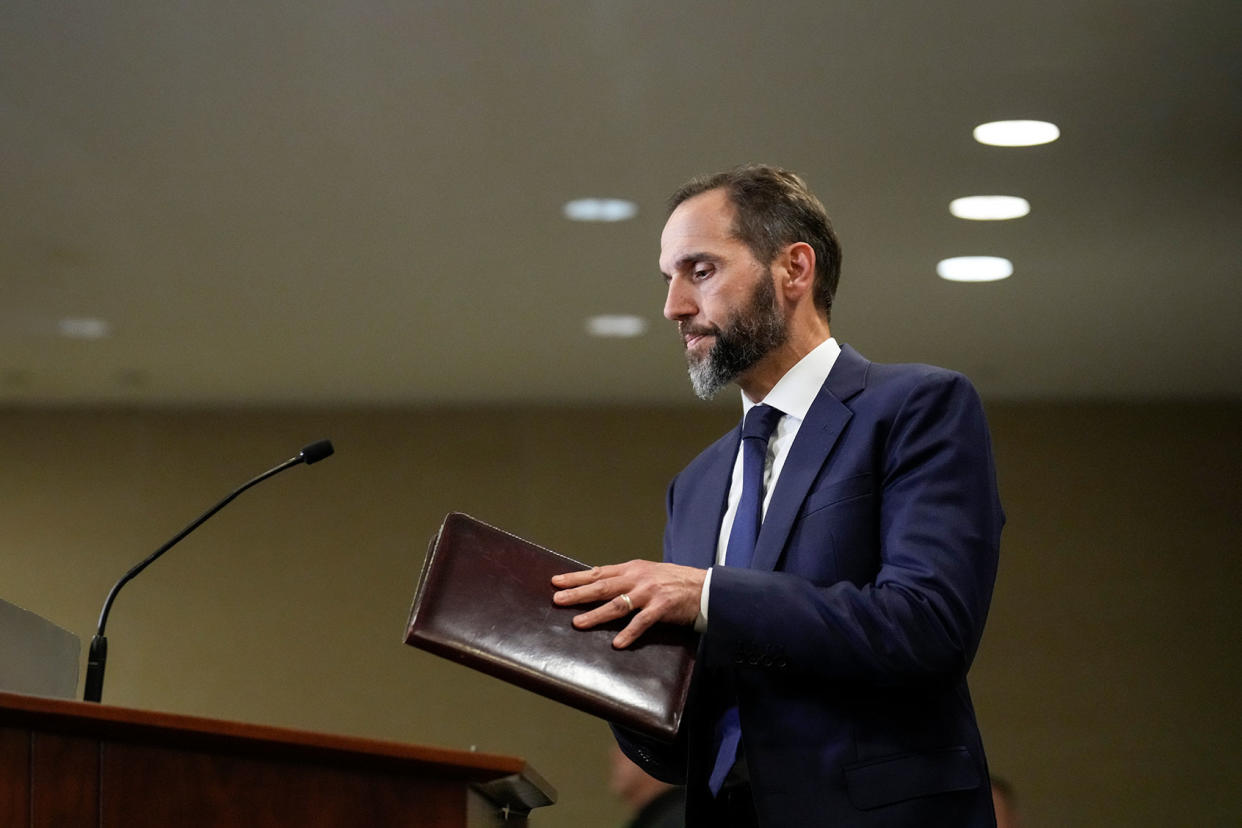"Chance for them to seek a recusal": Experts say Judge Cannon could give Jack Smith ammo to boot her

- Oops!Something went wrong.Please try again later.
- Oops!Something went wrong.Please try again later.
The downside to U.S. District Judge Aileen Cannon scheduling hearings on just about every frivolous claim raised by Donald Trump’s defense is that, eventually, she will have to start making decisions. That — not just entertaining each argument, as it shifts, from the former president, but actually ruling on them — has not worked out well for her in the past and could be how special counsel Jack Smith gets the classified documents case closer to trial.
In recent days, Cannon, who was nominated by Trump in the time between his losing the 2020 election and his inciting the January 6 insurrection, has held hearings and collected filings on a range of issues raised by the defense. Among them: that the naming of a special counsel violates the Constitution; that not specifying a cap on the special counsel’s funding abrogates congressional authority; that the search warrant for Mar-a-Lago was overly broad; and that the whole case should be thrown out because some of the state secrets recovered at Trump’s property were later returned to their boxes in a different order.
At the same time, Smith himself is seeking to modify Trump’s bail conditions, arguing that he should be barred from falsely claiming that FBI agents were authorized to do the “unthinkable” and shoot him dead — another issue Cannon will have to rule on.
The danger for this particular federal judge is that anything she does is potentially subject to review by an 11th Circuit Court of Appeals that has already unanimously, and harshly, rejected her rulings before: In 2022, a panel of conservative judges chided her for ruling that the government could not even review the classified documents it found in south Florida and appointing a so-called “special master” to do so instead.
“Everything she’s heard these last three days, a negative decision would be appealable by Jack Smith,” Mary McCord, a former federal prosecutor, noted in an appearance Tuesday on MSNBC. “Depending on the circumstances,” she added, such an appeal “may or may not be a chance for them to seek a recusal.”
It is unlikely, even now, that Smith would seek to have Cannon removed from the case altogether and try to start it all over again with a new judge. For one, other judges are unlikely to take such a request lightly, typically granting significant discretion to their colleagues on how to proceed with a case, barring clear misconduct. But Cannon’s superiors have demonstrated a willingness to slap down her misapplications of the law.
Smith, in a filing on Monday, alluded to those judges who have the power to overturn Cannon’s decisions, when she decides to make them.
Concerning Trump’s argument that the case should be dismissed because some papers were shuffled around in a box, denying him the ability to claim he might not have seen any state secrets at issue in the case — an argument that can be “added to a list of other evolving, unsupported, and inconsistent explanations for his possession of classified documents” — Smith’s 33-page filing noted that the 11th Circuit, in particular, “has never found that a defendant’s due process rights were violated by the government’s loss or destruction of evidence.” (Besides, Smith added: Trump has already admitted to possessing the documents in question, variously claiming they were planted and that he declassified them in his mind).
Barbara McQuade, a former U.S. attorney who teaches law at the University of Michigan, noted the extreme reach that is Trump’s defense here. “They’re asking not just that the evidence be suppressed but the whole case be dismissed, suggesting there is something nefarious about all this,” she told MSNBC. It’s clearly not, she argued, but if Cannon rules that there’s something to it that is also clear grounds for Smith to appeal.
Hemming and hawing isn’t that much better an option, either.
“At some point,” McQuade said, “if she simply fails to rule on these motions or set a trial date, that could be a basis for seeking a writ of mandamus, which is really just a request for the higher court to say to the district judge: make a decision, do your job, the time has come, you can’t wait anymore.” Prosecutors have typically only turned to such a writ as a last resort, she added: “It is supposed to be granted only under rare circumstances, but at some point that is a card that the government can play if the judge continues to delay in making decisions.”
There are some, however, who see the piling up of unresolved issues in Cannon’s courtroom as a potential boon not to the defense — and Trump’s strategy of having the case delayed until after the election — but to prosecutors who have more time to build a stronger case. Just this week it was reported that Trump took a previously undisclosed trip to Mar-a-Lago in the weeks ahead of the FBI raid and that he suggested to his lawyers that they just lie and deny that he had any classified documents at all.
“[O]ne thing about this case,” former U.S. attorney Joyce Vance posted on social media: “over time, the government’s evidence keeps getting better.” Delay “helps Trump in a very real sense,” she continued, “but also hurts.”


